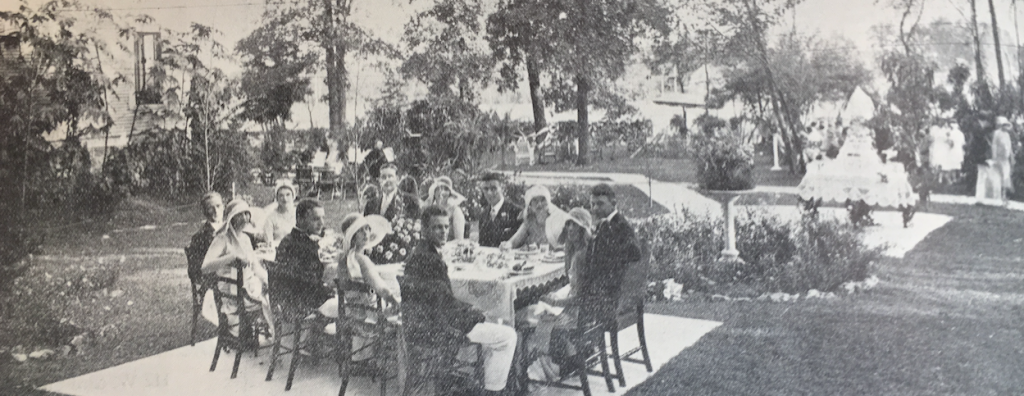Toast To Olde Tymes – Tie The Knot
It’s a near certainty that any wedding planned during the past few years has involved challenges that would have taxed the minds of the finest screenwriters during the glory days of Hollywood.
We like to imagine that true love conquers all. Prior to the pandemic, wedding planning was often chronicled in the media as a source of stress. There was such a focus on getting everything perfect – as though that were possible! Gretchen Rubin, author of The Happiness Project, received some advice that bears repeating from her mother, Karen Craft, before her wedding in Our Town: “The things that go wrong often make the best memories.” Now, obviously, this works better when the topic is something fairly minor, rather than illness and potential death.

Margaret Lackland Stoddard and Henry Stevens Cowgill, Jr. were married in September 1927. The bride, who was known as Peggy, was the daughter of Mr. and Mrs. Solomon Stoddard. Her father had his own real estate firm in Kansas City. Her groom was the son of Mr. and Mrs. Henry Stevens Cowgill of Carthage, Missouri. His father owned a flour mill. Peggy had graduated from Barstow and Ogontz College. In addition, she had spent a year in Florence, Italy, where she studied voice and music. Henry was a Yale graduate. Dr. Robert Nelson Spencer (not yet a bishop) officiated at the ceremony, which was held at “Twin Oaks,” the Stoddards’ “country estate” in Sarcoxie, Missouri, with approximately 150 guests present. As our scribe noted, “A novel aisle for the bridal party was marked from the pillared portico of the house, by dwarf cedar trees, shrubbery, standards of pink gladioli and white ribbons. The altar, which had for its background masses of growing blossoms, baskets of gladioli and smilax, was also marked by cedars, under the spreading branches of oak trees. An orchestra, behind a smilax screen, played the wedding music and a program preceding the service… The wedding supper was served at quartet tables in the garden. The bridal table in the bride’s formal garden nearby, had a centerpiece of hearts entwined, fashioned of pink roses. The wedding cake, decorated with pastel-toned flowers, was in a heart design of Sweetheart roses, supported by Dresden pillars and topped by a doll figure of a bride, the costume a replica of that worn by Peggy.”
What went wrong? “Guests Ill With Ptomaine After A Bridal Supper” was a headline in the September 22, 1927 issue of the Mexico [Missouri] Weekly Ledger. According to the article, “The first symptoms of poisoning appeared soon after the guests left the Stoddard home. Physicians were summoned to attend guests in Joplin, Carthage, Sarcoxie and other Jasper County homes.” On the 19th, the Kansas City Star had run the tagline “Several of Her Wedding Guests Became Ill After a Bridal Supper” above a photo of Peggy as she looked on the day she became Mrs. Cowgill. If the juxtaposition seemed unfortunate, the text below the picture made it clear just how dire the situation had been: “A check today revealed approximately 100 guests had been ill of ptomaine poisoning following the supper. Only three persons were taken to hospitals, and today all were on the way to recovery.” It seemed likely that “pressed chicken” was the culprit.
What went right? Peggy and Henry became the parents of a daughter and son and remained married for the rest of their lives. They spent the early years of their marriage in Carthage, where Henry served two terms as mayor. (Apparently, the voters didn’t blame him for the foul fowl.) In 1942, the Cowgills moved to Michigan, where Henry worked first for a milling company and then for a brokerage firm. Henry died in 1970, and Margaret outlived him by 14 years.
Featured in the July 9, 2022 issue of The Independent.
By Heather N. Paxton





